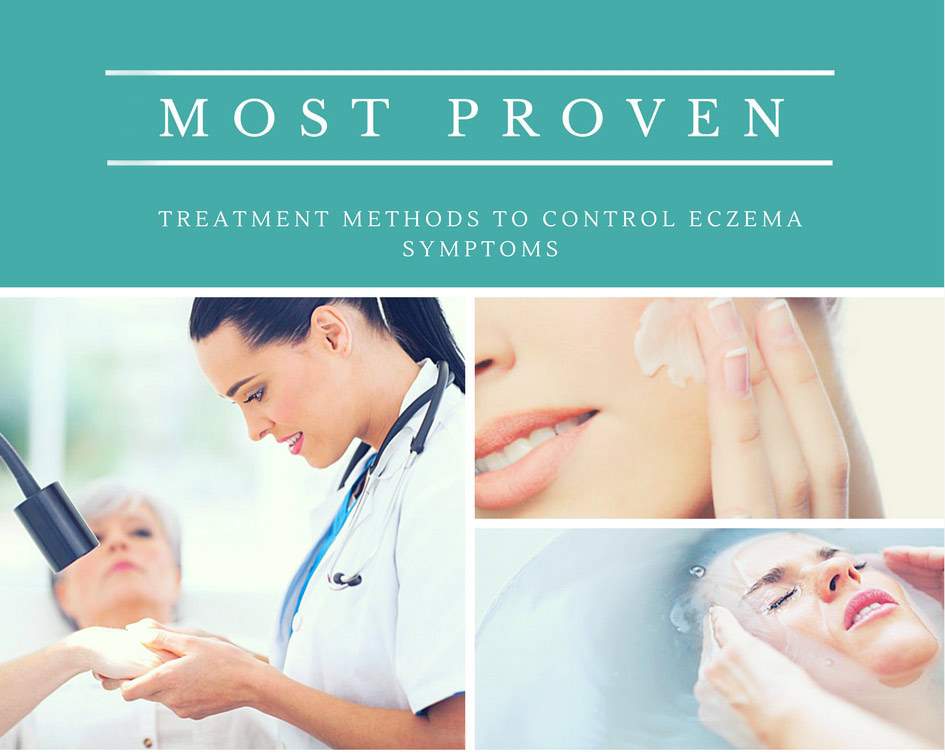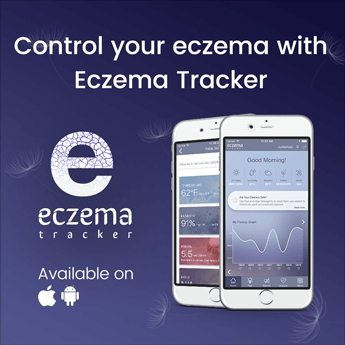The suggested home remedies for eczema can help control eczema in an effective manner and prevent eczema flareups. It is highly recommended to include these eczema home remedies as a part of daily eczema-care regime. However, it should be noted that a treatment that works well for an individual might not work for the other.
- Dry, sensitive skin.
- Intense itching.
- Red, inflamed skin.
- Recurring rash.
- Scaly areas.
- Rough, leathery patches.
- Oozing or crusting.
- Areas of swelling.
Also Read: What Are The Various Types Of Eczema & Their Symptoms?
5 Most Proven Home Remedies to Control Eczema Symptoms
To help reduce itching, soothe inflamed skin and get rid of eczema symptoms, try these proven eczema home care remedies listed below:
1) Frequent bathing and Bleach baths
Initially, it was believed that frequent bathing could aggravate the eczema symptoms, however, the logical reasoning behind suggests that eczema-prone individuals can be benefited from bathing. Staphylococcal is a bacteria that commonly grows on the surface of the skin and is considered to trigger eczema flares. By cleansing the body well, you can remove and restrict the growth of the bacteria, thus, alleviating the skin condition.
However, make sure to use lukewarm water for bathing and it should not last for more than 10 minutes. This will help keep the skin hydrated and cool. Moreover, it aids in controlling the urge to itch.
Bleach baths may sound like putting your body through dangerous chemicals, but the approach is highly recommended by dermatologists for babies and individuals with moderate to severe AD. A highly-diluted bleach bath is supposed to be adopted in order to prevent the growth of bacteria. In case of babies, make sure to undertake proper guidance from the pediatrician.
2) Moisturizers
It is highly important to moisturize your body within three minutes after taking a bath. Moisturization done during this time is considered most effective. In case of eczema, oil-based moisturizers are preferable over water-based ones. The more the content of oil in the moisturizer, the better it is for treating eczema-prone skin. It is advised that a thick layer of ointments, moisturizers or lotions be applied at least twice in a day.
Depending upon the eczema symptoms, you may prefer using ointment over other means for hydrating the skin. Ointments contain the highest composition of oil in comparison to all other products. Moreover, they don’t produce any burning sensation when applied to sensitive skin.
The hot and humid weather during summers might demand you to switch to creams or moisturizers. Creams contain less amount of oil in comparison to ointments, hence, are preferred to prevent prickly heat.
3) Steroid Ointments
Mild eczema symptoms can be managed by adopting a proper eczema-care regime focusing on bathing and moisturizing routine. In a few cases of moderate to severe AD, the dermatologist may prescribe a low or medium potency topical steroid ointment called topical corticosteroids. These corticosteroids help control the symptoms from aggravating.
You must ensure that these ointments are used in the correct manner to avail the benefits. Consult the dermatologist to know which one is best according to your symptoms. Safe steroid ointment application is necessary to help treat the affected areas and prevent the negative consequences.
4) Cleansers
Cleansers play an essential role during the course of eczema treatment and thereafter. For bathing and washing purposes, you must use mild and unscented soaps or detergents. The perfumed and antibacterial cleansers are hard for the skin and can further irritate it. Also, the shampoo should be gentle, unscented and dye-free.
In addition, only the skin areas that are dirty must be washed using the soap, the rest of the body must be rinsed with water. Don’t rub the skin, simply pat dry it.
5) Consult a dermatologist/pediatrician
It is important to seek medical intervention to subside the severity of the condition. Depending on the sternness of the symptoms, the specialist doctor may recommend steroid ointments, antibiotics or other treatments like wet wrap therapy, Eczema phototherapy and likewise.
6 Home Remedies to Prevent Eczema Flare-ups
1) Essential Oils For Eczema
Oils are considered to carry anti-inflammatory and antibacterial properties. They provide moisturization to the affected area, thus, are sometimes referred to as ‘natural moisturizers’. You can look for commonly available oils namely, olive oil, coconut oil and tea tree oil to treat eczema.
Olive oil: This oil is recommended to be applied on a daily basis on the affected areas to help soften and nourish the skin. It is highly rich in vitamin E, omega – 3 fatty acids and other nutrients that keeps the skin hydrated, preventing it from drying. In addition, it acts as an anti-inflammatory agent and prohibits the growth of bacteria and other microbes.
Coconut oil: It is an excellent source of moisturization. The oil carries essential nutrients that help protect the skin from bacterial and fungal infection and inhibits the growth of other microbes. The formulation of caprylic acid, capric acid, vitamin E, and K helps the oil prevent itchiness and inflammation.
Tea Tree Oil: The oil is extracted from the leaves of Melaleuca alternifolia. It guards the skin from the attack of microbes. In addition, it helps in alleviating the inflammatory reaction, thus, healing the skin. Tea tree oil even carries antiseptic properties.
2) First Aid Plant- Aloe Vera For Eczema
Aloe vera is considered around the globe for its healing properties. Internal and external use of this medicinal plant is found to be beneficial in alleviating the eczema symptoms. You can apply it on the affected skin in the form of gel to receive a soothing effect and consume it in juice form to build a strong immune system.
3) Applying Oatmeal
Being rich in nutrients, oatmeal is known as an essential component for a healthy diet. Topical application of oatmeal is taken as beneficial for eczema-prone skin.
You can either ground the oatmeal and mix it with your bathing water or simply apply an oatmeal paste on the affected area to gain the following benefits:
- Provide soothing effect to the irritated skin
- Reduces inflammation
- Provides relief against itchiness
Also Read: Top 10 Baths Solutions For Eczema
4) Apple Cider Vinegar (ACV)
ACV includes varied essential vitamins and minerals that help boost the immune system. One of its major component, beta-carotene plays an important role in the renewal mechanism of skin cells and helps in making the skin healthy. It eliminates the eczema-causing toxins from the body and helps maintain the pH balance of skin.
Also Read – Apple Cider Vinegar for Eczema Infections
5) Bleach Baths (not so natural)
Bleach baths, although not so natural, are the most effective method of bacterial elimination on eczema skin. There are various studies that have proven the effectiveness of bleach baths for severe eczema cases. More studies links the included below.
6)Probiotics
Probiotics are one supplement that seems to make a noticeable difference with skin health (especially if the problem is diet/gut related). The latest trend has been in topical probiotics, which is still a new and unproven concept.
Here are the links for the studies:
“Management of atopic dermatitis: safety and efficacy of phototherapy”
http://www.ncbi.nlm.nih.gov/pubmed/26491366
Further Reading:
Weeping Eczema | Eczema on Lips | Dyshidrotic Eczema | Eczema on Hands | Follicular Eczema | Eczema on Ear | Eczema on Eyes | Nummular Eczema | Eczema on Face | Perioral Dermatitis









